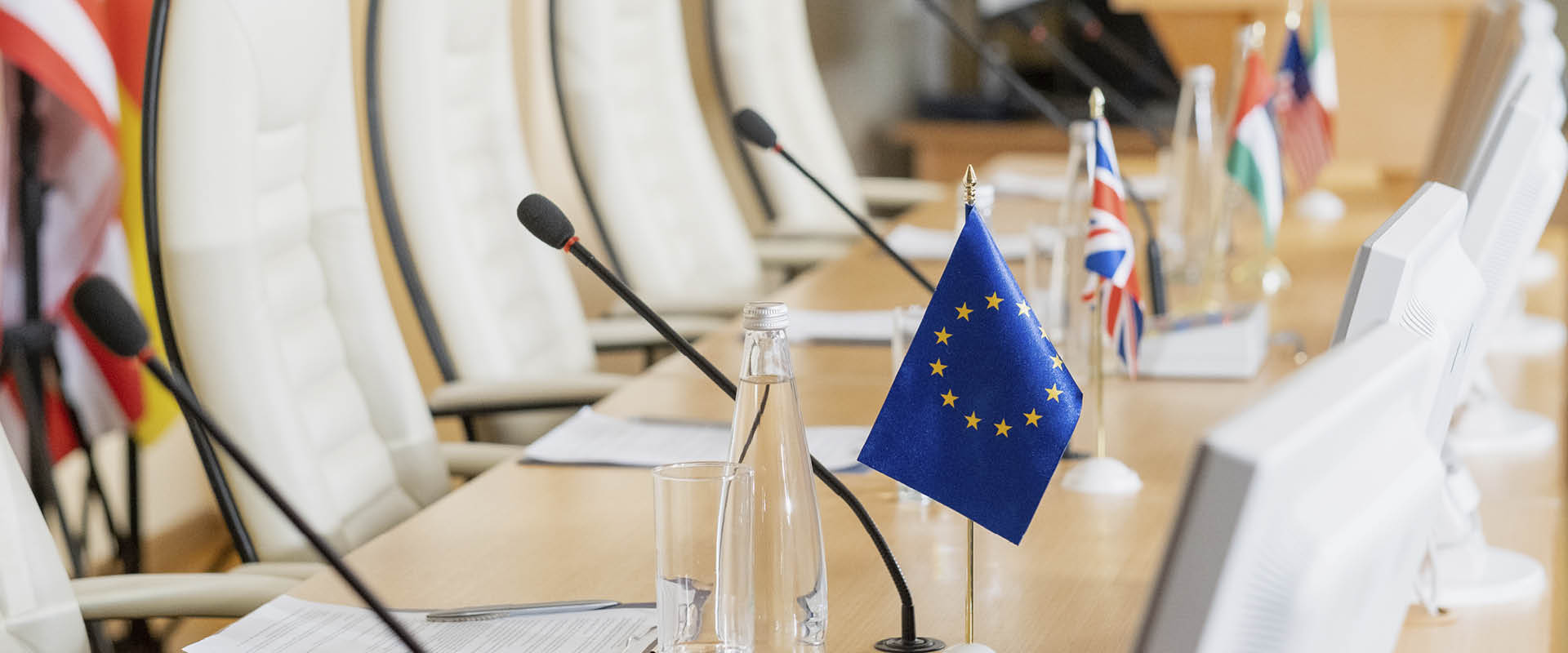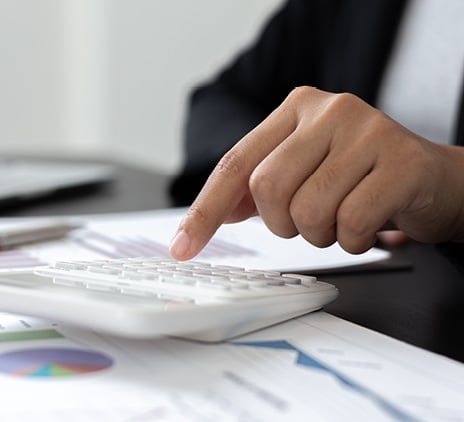-
Financial administration
An accurate financial administration provides you with the information you need to take the right decisions. The big advantage of a digital financial administration is that it provides insight into your most important financial processes at any time, whether this is the invoices, salary payments or bank changes.
-
Financial insight
You want to take the right decisions, based on trustworthy and clear management information. You want to have access to all your financial data, 24/7, in order to determine your position and be able to adjust where necessary.
-
Global compliance partnering
Outsourced compliance services comprises the total financial compliance of your business, in accounting, financial reporting, payroll, legal and various tax reporting obligations. We can make sure you don’t have to worry.

-
Impact House by Grant Thornton
Building sustainability and social impact. That sounds good. But how do you go about it in the complex world of stakeholders, regulations and frameworks and changing demands from clients and society? How do you deal with important issues such as climate change and biodiversity loss?
-
Business risk services
Minimize risk, maximize predictability, and execution Good insights help you look further ahead and adapt faster. Whether you require outsourced or co-procured internal audit services and expertise to address a specific technology, cyber or regulatory challenge, we provide a turnkey and reliable solution.
-
Cyber risk services
What should I be doing first if my data has been kidnapped? Have I taken the right precautions for protecting my data or am I putting too much effort into just one of the risks? And how do I quickly detect intruders on my network? Good questions! We help you to answer these questions.
-
Deal advisory
What will the net proceeds be after the sale? How do I optimise the selling price of my business or the price of one of my business activities?
-
Forensic & integrity services
Do you require a fact finding investigation to help assess irregularities? Is it necessary to ascertain facts for litigation purposes?

-
Auditing of annual accounts
You are answerable to others, such as shareholders and other stakeholders, with regard to your financial affairs. Financial information must therefore be reliable. What is more, you want to know how far you are progressing towards achieving your goals and what risks may apply.
-
IFRS services
Financial reporting in accordance with IFRS is a complex matter. Nowadays, an increasing number of international companies are becoming aware of the rules. But how do you apply them in practice?
-
ISAE & SOC Reporting
Our ISAE & SOC Reporting services provide independent and objective reports on the design, implementation and operational effectiveness of controls at service organizations.
-
Pre-audit services
Pre-audit services is all about making the company’s entire financial administration ready for checking before the external accountant begins his/her audit of the annual accounts.
-
SOx law implementation
The SOx legislation dictates that management is structurally accountable for reporting on the internal control relevant to the financial statements.

-
International corporate tax
The Netherlands’ tax regime is highly dynamic. Rules and the administrative courts raise new challenges in fiscal considerations on a nearly daily basis, both nationally and internationally.
-
VAT advice
VAT is an exceptionally thorny issue, especially in major national and international activities. Filing cross-border returns, registering or making payments requires specialised knowledge. It is crucial to keep that knowledge up-to-date in order to respond to the dynamics of national and international legislation and regulation.
-
Customs
Importing/exporting goods to or from the European Union involves navigating complicated customs formalities. Failure to comply with these requirements usually results in delays. In addition, an excessively high rate of taxation or customs valuation for imports can cost you money.
-
Human Capital Services
Do your employees determine the success and growth of your organisation? And are you in need of specialists which you can ask your Human Resources (HR) related questions? Human Resources (HR) related questions? Our HR specialists will assist you in the areas of personnel and payroll administration, labour law and taxation relating to your personnel. We provide you with high-quality personnel and payroll administration, good HR guidance and the right (international) advice as standard. All this, of course, with a focus on the human dimension.
-
Innovation & grants
Anyone who runs their own business sets themselves apart from the rest. Anyone who dares stick their neck out distinguishes themselves even more. That can be rather lucrative.
-
Tax technology
Driven by tax technology, we help you with your (most important) tax risks. Identify and manage your risks and become in control!
-
Transfer pricing
The increased attention for transfer pricing places greater demands on the internal organisation and on reporting.
-
Sustainable tax
In this rapidly changing world, it is increasingly important to consider environmental impact (in accordance with ESG), instead of limiting considerations to financial incentives. Multinational companies should review and potentially reconsider their tax strategy due to the constantly evolving social standards
-
Pillar Two
On 1 January 2024 the European Union will introduce a new tax law named “Pillar Two”. These new regulations will be applicable to groups with a turnover of more than EUR 750 million.
-
Cryptocurrency and digital assets
In the past decade, the utilization of blockchain and its adoption of a distributed ledger have proven their capacity to revolutionize the financial sector, inspiring numerous initiatives from businesses and entrepreneurs.
-
Streamlined Global Compliance
Large corporations with a presence in multiple jurisdictions face a number of compliance challenges. Not least of these are the varied and complex reporting and compliance requirements imposed by different countries. To overcome these challenges, Grant Thornton provides a solution to streamline the global compliance process by centralizing the delivery approach.
-
Corporate Law
From the general terms and conditions to the legal strategy, these matters need to be watertight. This provides assurance, and therefore peace of mind and room for growth. We will be pro-active and pragmatic in thinking along with you. We always like to look ahead and go the extra mile.
-
Employment Law
Small company or large multinational: in any company your people are of the utmost importance for your business. Employment brings with it many issues in many areas and often has legal consequences. For big strategic, but also for more everyday questions about employment law, our lawyers are ready to help you out. Also for questions about international employment law. Do you have your own HR department? We’ll gladly assist them. We deliver bespoke services and are there when you need us.
-
Sustainable legal
Sustainability is more than a buzzword - it is the core of our legal advice towards sustainable success. From drafting sustainable contracts, integrating sustainable HR policies and ESG due diligence within our M&A practice to advising on ESG and other (national and international) legislation: we prefer to be pragmatic and proactive in helping your business.
-
Maritime sector
How can you continue to be a global leader? The Netherlands depends on innovation. It is our high-quality knowledge which leads the maritime sector to be of world class.


Increase your understanding of VAT regulations for your business
Our VAT training sessions are tailored to fit your business activities, giving you insights and knowledge. Tailoring the training allows us to address the specific VAT challenges you face, making the learning experience more practical and relevant.
Background
A business may in principle deduct input VAT in so far as the costs are incurred for the purposes of its taxable economic activities. The purpose of the right to deduct VAT is to relieve businesses of any VAT costs.
If goods are disposed or services are provided free of charge (FOC), then the VAT paid on costs used for these free-of-charge (FOC) supplies is generally not deductible since such activities are considered to be non-economic activities which do not give a right to deduct any input VAT.
Alternatively, a business could become liable for VAT on so-called “deemed supplies” if it deducted input VAT on the costs. Article 16 of the EU VAT Directive (VD) provides that VAT should be charged on disposal of goods FOC or, more generally, their application for purposes other than those of business if VAT became deductible on those goods.
ECJ Case C-207/23 (Y KG)
The ECJ in its decisions has explained how VAT applies if the goods or services are disposed FOC. In its recent decision in Case C-207/23 (Y KG), the ECJ further clarified how VAT applies on FOC supplies.
Facts
Company Y produces biogas from biomass, converting it into electricity for the grid and heat for industrial use. Y had recovered VAT in full on the facility which produced the heat, and Y made that heat available FOC to neighboring asparagus farmers. The German tax authorities assessed Y for VAT on a deemed supply of goods because it had given away the heat FOC. Y should pay VAT on supply of heat FOC, based on the heat's cost price. Y contested this, and the Federal Finance Court referred the case to the ECJ.
Questions
The German Federal Finance Court referred the following questions to the ECJ:
- Does the application of Article 16 of the VD — concerning disposals of goods FOC — depend on whether the recipient uses the heat in a VAT-deductible manner?
- How should the cost price of goods be calculated for VAT purposes?
Main conclusions of the decision
Is supply FOC taxable if the customer uses goods for its VATable transactions?
The ECJ clarified that Article 16 VD applies regardless of the recipient's use of the goods.
The conclusions of the ECJ in the case C-528/19 (Mitteldeutsche Hartstein-Industrie) were not applicable, as in that case the extension of the public road benefited the taxable person making the disposal FOC and had a direct and immediate link with its overall economic activity and, second, the cost of the input services received and linked to those works formed part of the cost elements of that taxable person’s output transactions.
By contrast, there was nothing to suggest that the heat was also used by Y. Costs were not made for economic activities of Y but for economic activities of farmers who received the heat FOC. Therefore, VAT became payable on deemed supplies although nothing was paid by the farmers.
How should the cost price of goods disposed FOC be calculated for VAT purposes?
The taxable base for VAT (when no purchase price is available) is the cost price, including direct and indirect (e.g. financing expenses) costs, irrespective whether those costs were subject to input VAT or not. The taxable value of deemed supplies should be as close as possible to a market value of similar goods.
Previous ECJ rulings
If the goods or services are disposed FOC this does not mean that VAT always becomes payable on deemed supplies or that VAT related to those services is non-deductible.
The ECJ has rules in its rulings (e.g. in Sveda (C-126/14), Iberdola (C-132/16) and Mitteldeutsche Hartstein-Industrie (C-528/19) that in principle, a VAT payer can deduct input VAT even if a third party benefits FOC from its activities.
In Sveda, the ECJ found the costs made for the construction of the trail made accessible FOC were included in the services which were later performed to the visitors of the trail. In Iberdola, the ECJ decided that, in principle, the right to deduct input VAT may exist for a supply of services consisting of building and renovating a property owned by a third party.
The ECJ imposes a condition that FOC supplies from which third parties benefit (‘spillover effects’), may not go beyond what is necessary to enable the VAT payer to carry out its own taxable transactions and their cost should be included in the price of those own transactions. From the case law of the ECJ it follows that in order to deduct input VAT in situations with spillover effects, the costs made should be “objectively necessary”’ and “not unreasonable.”
Conclusion
VAT can be deductible on expenses if they benefit a person other than the entrepreneur itself.
The VAT payer may deduct the VAT in full if, first, there is a direct and immediate link between that expenditure and the VAT payer’s economic activity, and second, the benefit to the third party is ancillary to the VAT payer’s business purposes.
If costs are incurred that only benefit a third party, input VAT is only deductible if those costs are passed on (with VAT) to the third party.
However, if the VAT has been deducted on costs made for the goods or services disposed FOC, then the VAT may become payable on deemed supplies, if the costs are not re-charged; and the goods do not benefit the business itself.
What are the practical consequences?
Entrepreneurs must ensure that the following conditions for VAT deduction are met when a third party benefits FOC from their activities/costs:
- Costs should be included in the price of its own output transactions.
- If a third party benefits from the costs FOC, the benefit to the third party should be ancillary to the VAT payer’s own business purposes. Such costs should be unavoidable and reasonable.
- The goods disposed FOC may not go beyond what is necessary to enable the VAT payer to carry out its own taxable transactions.
- If the output transactions only benefit third parties and the costs are not re-charged, then either the input VAT is not deductible or VAT becomes payable on deemed supplies.
When goods are disposed FOC, then the taxable of deemed supplies includes all costs including those on which input VAT was not deductible.
Businesses should also keep in mind that the EU member states apply the VAT rules in different ways.
Every case is different, and the facts and circumstances of it should be analyzed on a case-by-case basis in the light of legislation and ECJ case law. Please contact us if you have any questions or need any VAT advice.






